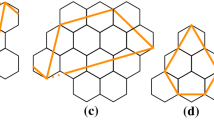Abstract
We investigate a folding problem that inquires whether a polygon P can be folded, without overlap or gaps, onto a polyhedron Q for given P and Q. An efficient algorithm for this problem when Q is a box was recently developed. We extend this idea to a class of convex polyhedra, which includes the five regular polyhedra, known as Platonic solids. Our algorithms use a common technique, which we call stamping. When we apply this technique, we use two special vertices shared by both P and Q (that is, there exist two vertices of P that are also vertices of Q). All convex polyhedra and their developments have such vertices, except a special class of tetrahedra, the tetramonohedra. We develop two algorithms for the problem as follows. For a given Q, when Q is not a tetramonohedron, we use the first algorithm which solves the folding problem for a certain class of convex polyhedra. On the other hand, if Q is a tetramonohedron, we use the second algorithm to handle this special case. Combining these algorithms, we can conclude that the folding problem can be solved in pseudo-polynomial time when Q is a polyhedron in a certain class of convex polyhedra that includes regular polyhedra.











Similar content being viewed by others
Notes
In some studies, a tetramonohedron is called an isotetrahedron or an isosceles tetrahedron.
The authors thank an anonymous referee of [8], who mentioned this point.
In this paper, we omit \(({\text {mod}}n)\) in \(\ell _i=(p_i,p_{i+1\,({\text {mod}}n)})\) for simplicity.
References
Akiyama, J.: Tile-makers and semi-tile-makers. Am. Math. Mon. 114(7), 602–609 (2007)
Akiyama, J., Matsunaga, K.: An algorithm for folding a Conway tile into an isotetrahedron or a rectangle dihedron. J. Inf. Process. 28, 750–758 (2020)
Altshiller-Court, N.: Modern Pure Solid Geometry. Chelsea, New York (1979)
de Berg, M., Cheong, O., van Kreveld, M., Overmars, M.: Computational Geometry: Algorithms and Applications. Springer, Berlin (2008)
Demaine, E.D., O’Rourke, J.: Geometric Folding Algorithms: Linkages, Origami, Polyhedra. Cambridge University Press, Cambridge (2007)
Dürer, A.: Underweysung der Messung, mit den Zirckel un Richtscheyt. In: Linien ebnen unnd gantzen Corporen. Nüremberg (1525)
Horiyama, T., Mizunashi, K.: Folding orthogonal polygons into rectangular boxes. In: 19th Japan-Korea Joint Workshop on Algorithms and Computation (Hakodate 2016)
Kamata, T., Kadoguchi, A., Horiyama, T., Uehara, R.: Efficient folding algorithms for regular polyhedra. In: 32nd Canadian Conference on Computational Geometry, pp. 131–137 (2020)
Kamata, T., Kadoguchi, A., Horiyama, T., Uehara, R.: Efficient folding algorithms for regular polyhedra (2021). arXiv:2105.14305
Mitani, J., Uehara, R.: Polygons folding to plural incongruent orthogonal boxes. In: 20th Canadian Conference on Computational Geometry (Montreal 2008), pp. 31–34 (2008)
Mizunashi, K., Horiyama, T., Uehara, R.: Efficient algorithm for box folding. J. Graph Algorithms Appl. 24(2), 89–103 (2020)
Schattschneider, D.: Will it tile? Try the Conway criterion! Math. Mag. 53(4), 224–233 (1980)
Xu, D., Horiyama, T., Shirakawa, T., Uehara, R.: Common developments of three incongruent boxes of area 30. Comput. Geom. 64, 1–17 (2017)
Author information
Authors and Affiliations
Corresponding author
Additional information
Editor in Charge: Kenneth Clarkson
Publisher's Note
Springer Nature remains neutral with regard to jurisdictional claims in published maps and institutional affiliations.
Part of this study was presented at CCCG 2020. Portions of this research was supported by JSPS KAKENHI Grant Numbers 17K00017, 18H04091, 20H05964, and 21K11757.
Rights and permissions
About this article
Cite this article
Kamata, T., Kadoguchi, A., Horiyama, T. et al. Efficient Folding Algorithms for Convex Polyhedra. Discrete Comput Geom 70, 1499–1522 (2023). https://doi.org/10.1007/s00454-022-00415-7
Received:
Revised:
Accepted:
Published:
Issue Date:
DOI: https://doi.org/10.1007/s00454-022-00415-7
Keywords
- Computational origami
- Folding problem
- Pseudo-polynomial time algorithm
- Regular polyhedron (Platonic
- Stamping




